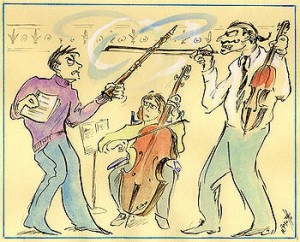
Competitions ≠ Success: A Student Perspective
Lev Mamuya
Not all competitions are created equal. There are good ones and bad ones, and good and bad reasons for entering. Many kids are raised to be competitive, both musically and in school. Kids can feel pressure to do competitions from parents, teachers and peers. Sometimes it is easy to fall into the trap of thinking success can only be measured by winning competitions and that a career in music and admission to a good school are impossible without numerous wins.
Competitions are good for many things, but they should not define success. They often consist of just one performance, on one particular day; success is something you achieve over many years through work and dedication. Since most competitions, at the most, will be three rounds over a short period of time, it is a mistake to believe you are successful or unsuccessful just because you won or lost. Many truly outstanding musicians have lost competitions because of a bad day, when in reality, they are better overall musicians than the winners. People shouldn’t beat themselves up over a loss, because, if you look at the big picture, it doesn’t make that much of a difference.

For me, part of the reason I enter competitions is for practice motivation. When preparing for a competition, I find I am able to focus and learn things faster. Like an audition, its an environment that I and many others struggle with, and so it is just good experience to perform in front of people.
I also find that sometimes the judges’ comments, whether formal or informal, help me improve my playing. Not all competitions offer this though, and when they do not make judges comments available, you just play and are sent away with no knowledge of why you lost.
Find out as much as you can about a particular competition before entering and decide whether you really think it will be a worthwhile experience. Many competitions consist of just playing and leaving, with a winner announced via email at the end of the day. It can be a very dehumanizing experience, so be prepared!
The most notable exception to this that I have taken part in was the Sphinx Competition, which was a high-quality, multi-day experience. The judges gave detailed comments and were happy to talk afterwards to the participants. There were master-classes and lectures as well. Everyone in the organization cared about not only finding a winner, but also helping and impacting the musical development of all participants in a meaningful way. I made many connections and friends during my week at Sphinx. Sphinx is an organization with a very defined mission and a model competition.
By now, I think I’ve made it clear that I don’t believe in competitions defining musical accomplishment, or in doing the ones where there isn’t something to be learned. Sure, it’s a huge ego boost to win and losing can sometimes lead to a lot of productive soul searching, but its not for everyone, they also have the potential to be really negative, and there are plenty of other ways to succeed in the field of music. But you can learn and grow from the good ones, so all students should probably do a few just for the experience of playing in a stressful, critical environment.
Competitions can be a tool to focus and improve your playing, but they should not be used to define your success or failure.
Subjects: Competition, Pre-College
Tags: Accomplishment, Auditions, cello, cellobello, Competition, ego, improvement, knowledge, Lev, Mamuya, master classes, motivation, music, organization, performance, Practice, pressure, success
